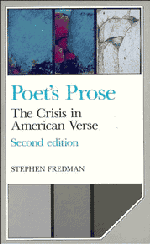Book contents
- Frontmatter
- Contents
- Preface to the second edition
- Preface to the first edition
- List of abbreviations
- Introduction: Prose and the American crisis of verse
- 1 The generative sentence: William Carlos Williams's Kora in Hell: Improvisations
- 2 “A life tracking itself”: Robert Creeley's Presences: A Test for Marisol
- 3 “He chose to include”: John Ashbery's Three Poems
- 4 The crisis at present: talk poems and the new poet's prose
- Notes
- Index
- Cambridge Studies in American Literature and Culture
1 - The generative sentence: William Carlos Williams's Kora in Hell: Improvisations
Published online by Cambridge University Press: 04 April 2011
- Frontmatter
- Contents
- Preface to the second edition
- Preface to the first edition
- List of abbreviations
- Introduction: Prose and the American crisis of verse
- 1 The generative sentence: William Carlos Williams's Kora in Hell: Improvisations
- 2 “A life tracking itself”: Robert Creeley's Presences: A Test for Marisol
- 3 “He chose to include”: John Ashbery's Three Poems
- 4 The crisis at present: talk poems and the new poet's prose
- Notes
- Index
- Cambridge Studies in American Literature and Culture
Summary
WORD VERSUS SYNTAX
Kindly note that all I have ever done has been the one thing. Pound will say that the improvisations are – etc. etc. twenty, forty years late. On the contrary he's all wet. Their excellence is, in major part, the shifting of category. It is the disjointing process.
WilliamsKora in Hell: Improvisations (Boston: Four Seas, 1920) is a unique work for its time and place. For Williams it inaugurated a remarkably fruitful decade of experimentation that is documented in the collection Imaginations (ed. Webster Schott [New York: New Directions, 1970]), which contains Kora in Hell, Spring and All (1923), The Great American Novel (1923), The Descent of Winter (1928), and A Novelette and Other Prose (1932). For American poetry Kora in Hell provided an energetic, attractive, and puzzling model of a native “poet's prose” that has continued to fascinate, especially after it was republished for the first time since 1920 by City Lights (San Francisco) in 1957. The book contains twenty-seven chapters of poet's prose, each consisting normally of three improvisations; following many improvisations is a discursive prose commentary; a long polemical prologue, entitled “The Return of the Sun,” begins the book. Written during World War I, the text is itself at war both with poetry as it has been traditionally conceived and with the expatriate wing of American modernism headed by Ezra Pound. In the prologue Williams attacks Pound and T. S. Eliot (and takes mild swipes at H. D. and Wallace Stevens) while defending the nonexpatriate avant-garde that included Marianne Moore, Walter Arensberg, Maxwell Bodenheim, Alfred Kreymborg, and Robert Brown.
- Type
- Chapter
- Information
- Poet's ProseThe Crisis in American Verse, pp. 14 - 56Publisher: Cambridge University PressPrint publication year: 1990



